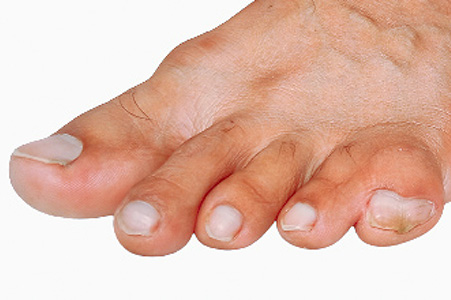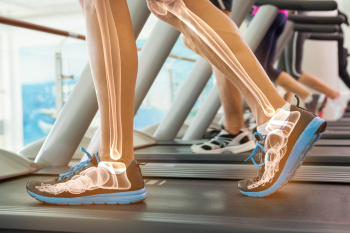
When an ingrown toenail becomes painful, infected, or keeps coming back, a podiatrist may recommend surgery to fix the problem. One common procedure is a partial nail removal, where the podiatrist carefully removes the edge of the nail that is growing into the skin. To help prevent the nail from growing back in the same way, a chemical may be applied to the base of the nail to stop regrowth in that area. This often leads to long-term relief. In more severe cases, especially when the problem keeps returning or involves swelling at the base of the nail, the entire toenail may need to be removed. This procedure may be necessary when a new toenail begins to grow underneath an old one, instead of pushing it forward like it normally should. If you have an extremely stubborn or painful ingrown toenail, it is suggested that you make an appointment with a podiatrist for an exam, diagnosis, and treatment.
Ingrown toenails may initially present themselves as a minor discomfort, but they may progress into an infection in the skin without proper treatment. For more information about ingrown toenails, contact Steven Spivak, DPM of Mount Holly Family Footcare. Our doctor can provide the care you need to keep you pain-free and on your feet.
Ingrown Toenails
Ingrown toenails are caused when the corner or side of a toenail grows into the soft flesh surrounding it. They often result in redness, swelling, pain, and in some cases, infection. This condition typically affects the big toe and may recur if it is not treated properly.
Causes
- Improper toenail trimming
- Genetics
- Improper shoe fitting
- Injury from pedicures or nail picking
- Abnormal gait
- Poor hygiene
You are more likely to develop an ingrown toenail if you are obese, have diabetes, arthritis, or have any fungal infection in your nails. Additionally, people who have foot or toe deformities are at a higher risk of developing an ingrown toenail.
Symptoms
Some symptoms of ingrown toenails are redness, swelling, and pain. In rare cases, there may be a yellowish drainage coming from the nail.
Treatment
Ignoring an ingrown toenail can have serious complications. Infections of the nail border can progress to a deeper soft-tissue infection, which can then turn into a bone infection. You should always speak with your podiatrist if you suspect you have an ingrown toenail, especially if you have diabetes or poor circulation.
If you have any questions, please feel free to contact our office located in Lumberton, NJ . We offer the newest diagnostic and treatment technologies for all your foot care needs.

Webbed toes, medically known as syndactyly, occur when two or more toes are fused together by skin, soft tissue, or bone. This condition develops during fetal growth when the toes fail to separate completely. It is a congenital trait, meaning it is present at birth and can run in families. Genetic factors play a significant role, though environmental influences during pregnancy may also contribute. Webbed toes are usually harmless and do not affect function, but in some cases, they may be associated with certain genetic syndromes. The degree of fusion varies, with some cases involving only skin while others include deeper connective tissues. If webbed toes cause discomfort or affect mobility, surgical separation may be an option. If you or your child have webbed toes that are causing any pain or difficulty in completing daily tasks, it is suggested that you consult a podiatrist for treatment options.
Congenital foot problems require immediate attention to avoid future complications. If you have any concerns, contact Steven Spivak, DPM of Mount Holly Family Footcare. Our doctor can provide the care you need to keep you pain-free and on your feet.
Congenital foot problems are deformities affecting the feet, toes, and/or ankles that children are born with. Some of these conditions have a genetic cause while others just happen. Some specific foot ailments that children may be born with include clubfeet, polydactyly/macrodactyly, and cleft foot. There are several other foot anomalies that can occur congenitally. What all of these conditions have in common is that a child may experience difficulty walking or performing everyday activities, as well as trouble finding footwear that fits their foot deformity. Some of these conditions are more serious than others. Consulting with a podiatrist as early as possible will help in properly diagnosing a child’s foot condition while getting the necessary treatment underway.
What are Causes of Congenital Foot Problem?
A congenital foot problem is one that happens to a child at birth. These conditions can be caused by a genetic predisposition, developmental or positional abnormalities during gestation, or with no known cause.
What are Symptoms of Congenital Foot Problems?
Symptoms vary by the congenital condition. Symptoms may consist of the following:
- Clubfoot, where tendons are shortened, bones are shaped differently, and the Achilles tendon is tight, causing the foot to point in and down. It is also possible for the soles of the feet to face each other.
- Polydactyly, which usually consists of a nubbin or small lump of tissue without a bone, a toe that is partially formed but has no joints, or an extra toe.
- Vertical talus, where the talus bone forms in the wrong position causing other bones in the foot to line up improperly, the front of the foot to point up, and the bottom of the foot to stiffen, with no arch, and to curve out.
- Tarsal coalition, when there is an abnormal connection of two or more bones in the foot leading to severe, rigid flatfoot.
- Cleft foot, where there are missing toes, a V-shaped cleft, and other anatomical differences.
- Macrodactyly, when the toes are abnormally large due to overgrowth of the underlying bone or soft tissue.
Treatment and Prevention
While there is nothing one can do to prevent congenital foot problems, raising awareness and receiving neonatal screenings are important. Early detection by taking your child to a podiatrist leads to the best outcome possible.
If you have any questions please feel free to contact our office located in Lumberton, NJ . We offer the newest diagnostic tools and technology to treat your foot and ankle needs.

Running outdoors and on a treadmill each place different demands on the feet, toes, and ankles. Treadmill running offers a flat, cushioned surface that may reduce impact and be easier on the joints, but it can also limit the engagement of stabilizing muscles in the ankles and feet. Because the treadmill belt assists forward movement, runners may experience shorter strides and reduced ankle flexing movement. In contrast, outdoor running requires the body to adapt to uneven terrain, which strengthens the smaller muscles in the feet and ankles, but may also increase the risk of sprains, stress fractures, and tendon strain. Foot positioning, stride length, and ankle alignment can vary significantly depending on the running surface, and these differences can affect the arches, toes, and heel strike. Plus, improper footwear or technique in either setting can lead to pain or injury over time. A podiatrist can evaluate foot mechanics, identify imbalances, and recommend running strategies or footwear to help prevent injuries for either running surface. If you have foot problems related to running, it is suggested that you schedule an appointment with a podiatrist for an exam and appropriate treatment.
All runners should take extra precaution when trying to avoid injury. If you have any concerns about your feet, contact Steven Spivak, DPM of Mount Holly Family Footcare. Our doctor will treat your foot and ankle needs.
How to Prevent Running Injuries
There are a lot of mistakes a runner can make prior to a workout that can induce injury. A lot of athletes tend to overstretch before running, instead of saving those workouts for a post-run routine. Deep lunges and hand-to-toe hamstring pulls should be performed after a workout instead of during a warmup. Another common mistake is jumping into an intense routine before your body is physically prepared for it. You should try to ease your way into long-distance running instead of forcing yourself to rush into it.
More Tips for Preventing Injury
- Incorporate Strength Training into Workouts - This will help improve the body’s overall athleticism
- Improve and Maintain Your Flexibility – Stretching everyday will help improve overall performance
- “Warm Up” Before Running and “Cool Down” Afterward – A warm up of 5-10 minutes helps get rid of lactic acid in the muscles and prevents delayed muscle soreness
- Cross-Training is Crucial
- Wear Proper Running Shoes
- Have a Formal Gait Analysis – Poor biomechanics can easily cause injury
If you have any questions, please feel free to contact our office located in Lumberton, NJ . We offer the newest diagnostic and treatment technologies for all your foot care needs.





